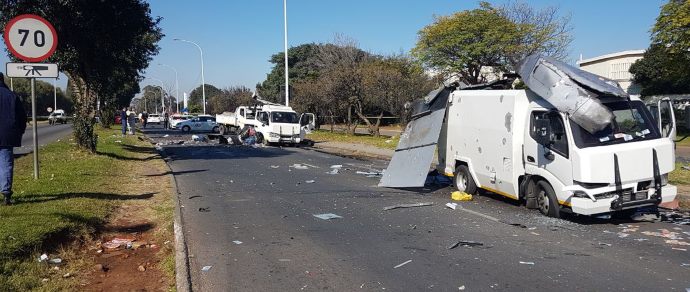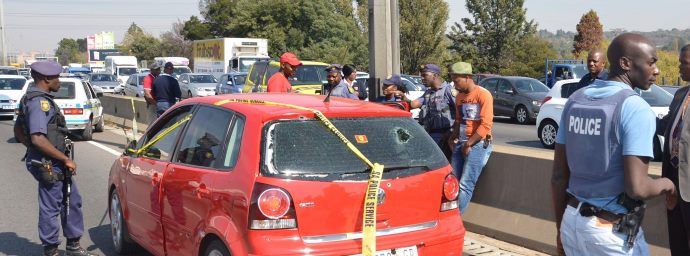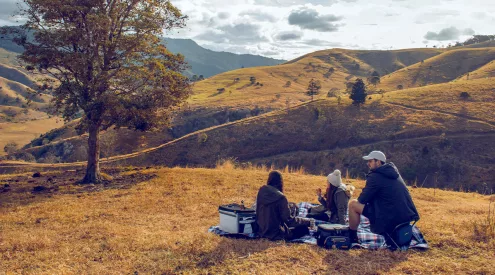We sadly experience on our roads, not only threats from irresponsible and bad drivers but also threats to life and property from criminals targeting road users.
Nearly every day we are warned of or hear about a protest action on a road somewhere, a hijack or a cash-in-transit robbery.
On the Arrive Alive website, we share safety advice and offer suggestions on how to drive in areas of civil unrest, riots and protest action. We also offer guidance on how to prevent hijackings and smash-and-grabs.
But what can we do when witnessing criminal activity on our roads? Can we and should we assist our fellow road users when witnessing these incidents and what do we need to know about reporting to the police and others?
We decided to discuss this and offer some important insights and advice!
What would we regard as Road Crime?
There are numerous crimes that are committed on or near our roads, having an impact on road users. For this discussion we would like to refer to some of these crimes:
- Criminals targeting private property: Cash-In-Transit Robberies, Hijackings, Vehicle Theft, Theft from Vehicles, Smash-and-Grab.
- Criminals targeting public property and infrastructure: Damaging roads, Vandalism of Traffic Signs and Traffic Lights, Theft of Manhole Covers and Road Barriers,
- Usage of vehicles in committing criminal acts: Reckless and illegal driving activities such as Hit-and-Run, Road Rage and Making Obscene Gestures.
We also find criminals placing rocks and other structures on the road surface or throwing rocks from bridges onto vehicles with the intent of causing a road crash to rob crash victims of their possessions.
Why should we care or do anything as witnesses?
All of us and our loved ones are worthy of protection and safety. We may all at some stage become the victim or need assistance to recover from the impact of the criminal activity.
When you witnessed a crime, it is important to consider reporting it to the Police. Although the consequences include that you may be required to testify, you will do your social responsibility and, in some way, prevent future similar crimes.
In the fleet industry, drivers receive training on how to deal with most, if not any, an emergency that may occur during his/ her duties.

It is important to remember in the fleet industry:
- Each company has its own emergency procedures-it is therefore up to the driver to become familiar with them.
- Some companies have forms that need to be filled in at the scene of the accident/incident.
- Other companies need to contact dispatch controllers as soon as the incident occurs.
We would like to take a closer look at what the everyday road users can do when witnessing a road crime.
Personal Safety is First Priority when Reporting Crime!
- The Golden Rule is Personal Safety First!
- You firstly need to consider your own safety – If this includes avoiding confrontation that will be the way to go!
- Our instinct is often to help the victim(s) in question – Yet, one should not get involved especially when criminals are armed.
- Do not try to be a hero e.g. crashing into the car of the culprit or trying to make a private arrest as this may endanger your life. No heroic gesture is worth your own life.
- Furthermore, the witness won’t be any help to anyone should he/she sustain an injury.
- Pay attention to road head, leaving enough distance between yourself and the position of the incident to ensure safety from explosive material, broken glass or leaked fuel resulting from a cash-in-transit heist or bombing.
- A witness should never draw attention to themselves or antagonise the suspects by hooting, hollering, or be seen to be taking images/videos of the incident.
- If you are followed, consider forwarding a moving locator, if your phone is equipped with this app, to a friend or family member.
- If you are not driving, you may consider making an audio recording of what you see on your phone if it could be done inconspicuously. You may raise the threat to your safety if you are observed recording the crime.

Let us look at a few examples:
What should we do when Witnessing a Cash-In-Transit Robbery?
- Due to the severity of the modus operandi that is used to affect this type of crime, the obvious reaction would be to stop and gawk at what is going on even to the point of taking video footage with a cell phone. DON’T
- Do not place yourself in danger of either being shot in the crossfire that enviably occurs or being accosted by one of the criminals who may be hiding in close proximity to you and may react irrationally to you taking a video.
- When observing a CIT attack, try and put as much distance between your vehicle and the crime scene. Do not exit your vehicle and if possible, turn your vehicle around and drive away.
- If you cannot move away from the crime scene, lower yourself behind the dashboard so that you are shielded by more metal in case shots are fired.
- The sensible thing to do would be to try and vacate the area if possible without jeopardizing oneself or other in the process.
- Personal safety first – If you cannot leave the area remain calm.
- During Cash in Transit Robberies and Cash in Transit Bombings the perpetrators are armed and dangerous, so you should never approach them.
- Immediately Contact the SAPS 10111 and report the crime. Remember to provide accurate information to the SAPS to ensure they can respond to the scene.
- If you can identify the Cash in Transit Company involved in the attack you can then also contact their National Control Room to report the incident so that they can arrange for medical and operational assistance.
- Do not switch off your vehicle, leave your vehicle in momentum, in case you need to escape the incident.
- Be vigilant of your own surroundings. Lock the vehicle doors and wait for emergency respondents to arrive at the scene.
- With caution, identify the criminals, get-a-away vehicles (s), or any information that may be valuable towards an investigation.
- Do not remain around the area to take video footage of the incident.
- Do not post any video footage on social media and release any footage that you may have in your possession to the SAPS and or the Cash in Transit Company to assist with their investigation.
Hijackings / Smash-And-Grab
- When observing a hijacking or smash and grab attack, DO NOT exit your vehicle to try and assist the victim. No one is faster than a bullet, so don’t put your life in danger.
- Make observations if at all possible, but your first objective is to stay safe.
- Make yourself a smaller target inside your vehicle by lowering yourself behind the dashboard and call for police assistance on the emergency number.
Hit-and-Run
- A witness should never attempt to follow a hit-and-run vehicle. In the worst case scenario, the witness could be the suspect’s next victim.
- Without jeopardizing your safety, attend to the victim, but try and memorize as much of the circumstances that took place and report to the authorities.
- Requesting immediate medical assistance and securing the scene to prevent a secondary collision into the victim would do far more for the victim than chasing after an offender.
- A witness should take note of the incident itself, assisting police officials with details of what has occurred.
- You may try to record the registration number but it is also important to try remembering the make and model of the vehicle, and any other distinctive marks (advert on the window). If you are not fluent in identifying types of vehicles, try to remember a description thereof.

Damage to Property such as crashing into traffic lights, theft of manholes/ road barriers
- Once again, do not confront the offending vehicle/driver. Take notes and report to the Police.
- Your chances of becoming a victim to road rage or worse is a risk not worth taking.
Who do we call when witnessing a road crime?
- When clearly a criminal act – Call the SAPS on the 10111 number.
- Where someone has been struck in a hit-and-run it is of the utmost importance to call the numbers of emergency medical services you may know or the Emergency numbers along our national roads such as 10177 or 112.
- When there appears to be criminal activity on our tolled roads, remember these roads are well managed with 24/7 operational call centres and able to summon immediate assistance from roads, traffic and medical personnel.
- Reckless driving can also be reported to the National Traffic Call Centre on the number 0861 400 800
What do we need to know when making the call as a witness to the SAPS or Call Centre Operator?
- When you report a crime after the occurrence thereof, do it as soon as possible after being the witness. Your memory may still be clear on the events and try to remember information gained from all the senses.
- When you call the Police, do not interrupt the initial call. Each call queue from anew which may waste time.
- Identify yourself, speaking not too fast (as we may do while under stress) indicating your location first, and thereafter explaining what you are witnessing.
- Some transport and freight companies may also offer a clearly displayed number to call when you witness bad driving and vehicle abuse.

When placing the call to Report Crime:
- Let the operator control the conversation. He or she will know the questions to ask and may likely be filling out a report that will help dispatch the police as quickly as possible.
- Stay on the line until the police arrive or until the operator tells you to hang up.
- Stay calm and concentrate on relating important details that will be most helpful to police.
Very few people can observe and recognize detail when confronted or involved in a trauma situation. We would like to offer guidance on what information may be requested from a witness.
The Call Centre Operator may ask for information on the following:
- Time of the incident
- Type of crime (automobile theft, assault, etc.)
- Location of the crime (street address and cross streets.)
- Vehicle details: Make and model, colour or registration number of the vehicle in transgression.
- The number of suspects/perpetrators and their gender.
- Description of suspects (height; build; the colour of eyes, hair and skin; clothing, the colour of clothing and disguises; special marks or unusual features such as scars and tattoos; and weapons, tools or vehicles used).
- The language which is spoken by the perpetrators.
- Description of property or person(s) being subjected to criminal activity.
- If the victim(s) is hurt and require medical assistance or has been kidnapped.
Ask the operator if they understood what has been relayed, how long the police or ambulance will take to arrive at the scene and request that the operator will report back to you.











